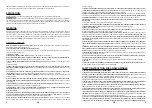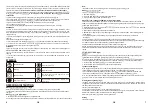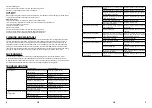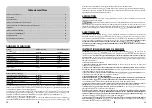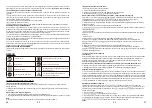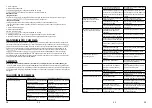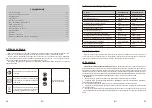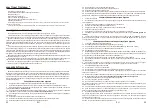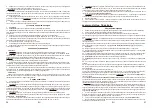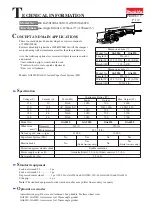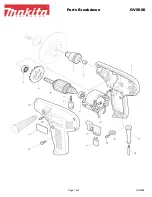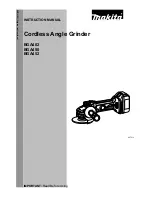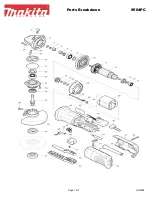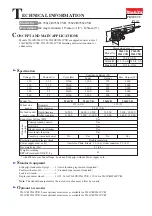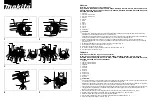
6
7
GB
GB
•
Dust from material such as paint containing lead, some wood species, minerals and metal may be harmful
(contact with or inhala
of the dust may cause allergic rea
s and/or respiratory diseases to the
operator or bystanders);
wear a dust mask and work with a dust extr
evice when connectable
•
Certain kinds of dust are
classified
as carcinogenic (such as oak and beech dust) especially in c
with
ves for wood c
wear a dust mask and work with a dust extr
device when
connectable
•
Follow the dust-related na
requirements for the materials you want to work with
•
Be careful when cu
g grooves, especially in suppor g walls (slots in suppor g walls are subject to
country
-specific
regula
regula
re to be observed under all circumstances)
• Clamp the
work piece in case it does not remain sta
ry from its own weight
• Do not clamp the
tool in a vice
• Use
completely unrolled and safe extension cords with a capacity of 16 Amps (
U
.K. 13 Amps)
DURING USE
•
Inrush currents cause short
voltage drops; under unfavourable power supply c
s, other
equipment may be a
ff
ected (if the system impedance of the power supply is lower than 0,104 + j0, 065
Ohm, disturbances are unlikely to occur); if y
ou need further clarifi
ca
you may contact your local power
supply authority
•
If the cord is damaged or cut through while working, do not touch the cord, but immediately disconnect
the plug;
• N
ever use the tool with a damaged cord
• In
case of electrical or mechanic
ately switch o
ff the
tool and disconnect the plug
•
In case of current interrup
or when the plug is accidentally pulled out, unlock the on/o
ff
switch
immediately in order to prevent uncontrolled rest
AFTER USE
•
A er switching o
ff
the tool, never stop the rota
of the accessory by a lateral force applied against it
WHEN
C
ONN
EC
TING NEW 3-PIN P
L
UG (U.K. ON
LY):
•
Do not connect the blue (= neutral) or brown (= live) wire in the cord of this tool to the earth terminal of
the plug
•
If for any reason the old plug is cut o
ff
the cord of this tool, it must be disposed of safely and not le
una ended
SYMBOLS
OPERATING INSTRUCTION
Moun
N
ever insert the mains plug in a socket when you are moun
/or removing the handle.
The handle (1) can be mounted on the angle grinder in three di
ff
eren
e
ht and on
the right.
Moun
rd
1. Care
fully fit the clamp of the gua
rd on the spindle sha
2.Turn the guard so that the exposed part of the disc is located as far as possible from your hand on the handle
Moun
ry!
ay be very hot!
1. Pull the mains plug.
2. P
ress and hold down the spindle locking (2)mechanism.
3. Unsc
re
w the flan
ge nut with the hook wrench.
Moun
t-o
ff, grinding and buffing discs
These discs are not included in the product contents. The diameter of the discs used may not exceed
100mm. The permissible speed specified on the discs mu
st be greater than the max, speed of your angle
grinder (see Technical data).
1. Moun
t the flan
ge C on the spindle sha
roove forward and turn it un
ks into place and
is securely seated on the spindle.
2. Place the disc on the flan
ge C with the swell forward.
3. Depending on the disc type, scre
w the flan
ge nut B onto the spindle as shown in the follo
wing figu
res:
- Grinding disc
For thick grinding discs, the pr
otruding ring E of the flan
ge nut B must extend into the disc hole.
-Cut-o
ff disc
For thin cut-o
ff discs, the p
r
otruding E of the flan
ge nut B must be poin
to the outside.
4.P
ress and hold down the spindle locking mechanism on the upper side of the device. Tight
en the flan
ge
nut with the hook wrench. Then release the spindle locking mechanism.
5.Check whether the mounted disc is able to freely rotate under the guard.
6.Keep the device away from your body. Insert the plug in a socket, turn on the device and let it run for
approximately 30 sec
onds without applying a load. Pull the plug and check wh
e
ther the disc is firmly
seated.
Note:
If applicable, you must stop working in order to adjus
rd.
Grinding and fine grinding
"Grinding" refers to working on a surface with a very coarse t
ool (e. g. a file or sandpaper). When grindin
g,
a large amount of material is removed, this is therefore alway
s the fi
rst work step. A erwards, the surface
can be work
ed on with a finer
tool.
1.Mount a corresponding disc.
2.Turn on the device and allow it to run without applying a load.
3.Turn the device so that that the disc is at an approximately 15° angle to the work piece. You will achieve
best results in this way and protect the device from being overloaded.
4.Work on the surface using uniform circular movements.
Buffing
1.Remove the guard
(Fig.1)
(Fig.6) (Fig.7)(Fig.8)
(Fig.2) (Fig.3)
va g
va
Before you start working with the two-handed angle grinder, check whether the voltage stated on the
specifi
ca
ate of the angle grinder corresponds to the available grid voltage.
A er switching o
ff
, the appliance con
to run on for a few seconds. Wait un
rading disc has
come to a stop before laying the appliance down. Insert the mains plug in a properly installed socket.
1. Set the On/O
ff
switch(3) t
to switch the appliance on.
2. Set the On/O
ff
switch t
to switch the appliance o
ff
.
(Fig.5)
(Fig.9)
(Fig.10)
Read the manual
Wear ear prot
Warning
Wear dusk mask
Double isula
Do not dispose of old appliances in the
household garbage
Wear eye prot
Disconnect from power supply while
maintance
Speed Controller
With the speed controller (4) you can adjust the speed according to applica
I
ropriate
speed se
ke sure the sander does not become overloaded and stops running.
Turn the speed controller (4) steplessly to the desired se
to increase or decrease the speed. The
controller can be adjusted from 1-6. The speed rate can be changed during opera
well.
Hint: The required speed rate for cu
resp,sanding a workpiece depends on the material that you are
going to process. For best performance, make some pr
cal tests.
Summary of Contents for MPAG950/115VQ
Page 21: ...38 RU 1 2 3 1 2 15 3 4 60 75 5...



